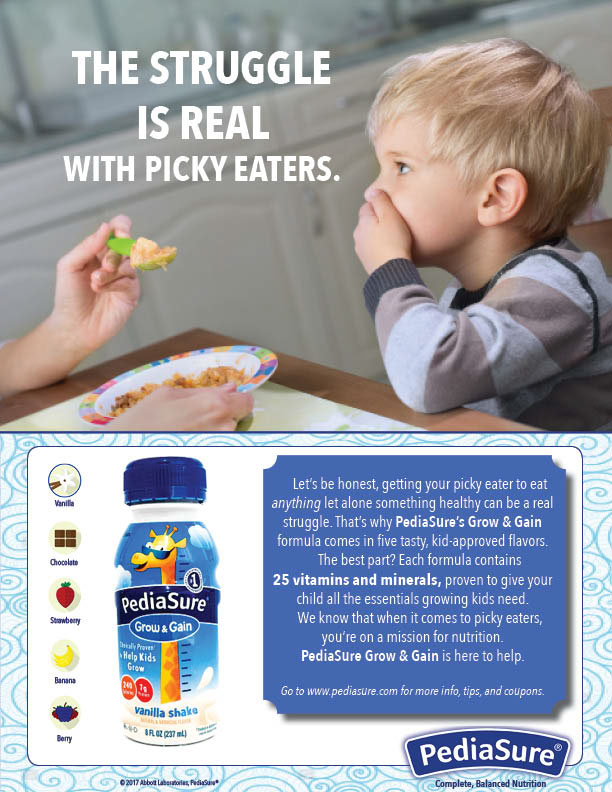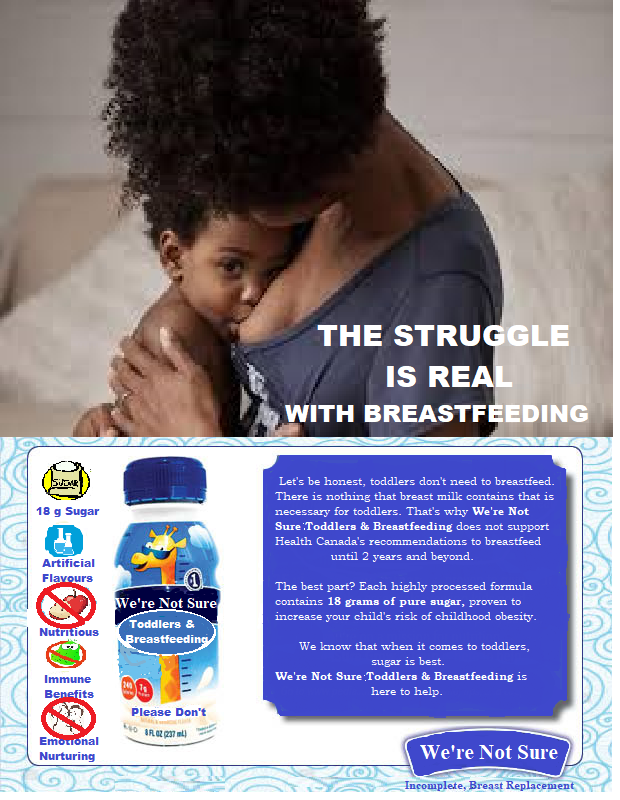
Original Advertisement by PediaSure

Culture Jam Image Source: Gap
The problem with the original ad: “PediaSure: Grow & Gain”
My culture jam assignment is addressing unhealthy, artificial products that are advertised as nutritious supplements for toddlers to support healthy growth, when in reality they are highly processed and filled with added sugars. It goes on to address a bigger underlying issue of toddler feeding – that breastfeeding is not considered an ideal nutrition source after babyhood, nor is it considered culturally acceptable to breastfeed a toddler. This is in large part due to the oversexualization of breasts in our culture and the lack of appreciation of breasts primary purpose – to feed and nurture our children.
Many myths exist in our society that do not support breastfeeding: breastfeeding is not necessary when baby can eat solid foods; breastfeeding is not nutritious after 6 months; breastfeeding past a year only benefits the mother’s emotional needs; breasts are solely sexual; and breast milk has no immune system benefits after infancy, are all commonly heard misconceptions.
In Western society, breastfeeding past a year is surrounded with stigma and distaste. Our society believes that breastfeeding into toddlerhood is inappropriate even though leading health authorities, including the World Health Organization, the American Academy of Pediatrics and Health Canada, all recommend and encourage breastfeeding until 2 years of age AND beyond.(1-3) Additionally, for the best possible start in life, the Public Health Agency of Canada supports and promotes breastfeeding as “the normal and unequalled way of providing optimal nutritional, immunological and emotional nurturing of infants AND toddlers”. (4)
A mother seen breastfeeding a walking and talking toddler would be considered shocking to most North Americans. There is currently a movement to normalize breastfeeding in Western culture – my culture jam hopes to contribute to the normalization of breastfeeding toddlers based on the fact that it is biologically normal and the strong supportive evidence that exists on the benefits of breastfeeding beyond infancy. (1-4)
**************************************************************************
Jamming philosophy
My culture jam aspired to invoke the absurdity that breastfeeding is not nutritious or appropriate for toddlers and that an artificial toddler drink provides essential nutrition for growth and health.
The name “PediaSure Grow and Gain” was replaced with “We’re Not Sure – Toddlers and Breastfeeding” to bring to light the underlying message of having toddler formulas – that society does not accept, tolerate and support breastfeeding past early infancy.
A picture of a contented breastfeeding toddler with the caption “The struggle is real with breastfeeding toddlers” is used to show the irony of the statement. The photo shows how it is completely normal and natural for a toddler to breastfeed in order to have a nutritionally complete diet, among the other benefits of breastfeeding such as: increased immunologic protection, nutrition, comfort and bonding.
The main text has been changed from PediaSure’s statement of the difficulties of feeding picky toddlers and that they are “here to help” with 25 vitamins and minerals; to a statement of We’re Not Sure’s stance on not supporting breastfeeding and highlights the high sugar content, as well as keeping the “we’re here to help” statement in irony.
The five available formula flavours on the left of the advertisement have been replaced with what is both found and not found in the formula ingredients. The culture jam lists the ingredients that are not shown in the original advertisement: sugar and artificial flavours. It shows what is found in breastmilk and cannot be artificially made in formula: optimal nutrition, immunological benefits and emotional nurturing.
The bottle was changed to read: Are You Sure: Breastfeeding and Toddlers. Please Don’t. This is a blunt statement of Western society’s feelings towards breastfeeding toddlers.
Finally, “Complete, balanced nutrition” became “Incomplete, Breast Replacement” because no formula can replace the optimal nutritional, immunological and emotional nurturing that breastfeeding provides. All of the changes to the original advertisement highlight how unhealthy the formula is and mock the absurdity that it is culturally unacceptable to breastfeed to normal term.
******************************************************************************
References
- World Health Organization. Exclusive breastfeeding for six months best for babies everywhere [Internet]. Who.int. 2019 [cited 10 February 2019]. Available from: https://www.who.int/mediacentre/news/statements/2011/breastfeeding_20110115/en/
- American Academy of Pediatrics. Breastfeeding and the use of human milk. J of Ped, 129(3), e827–e841.
- Health Canada. Infant feeding – food and nutrition. Hc-sc.gc.ca. [Internet] 2019 [cited 12 February 2019]. Available from: http://www.hc-sc.gc.ca/fn-an/nutrition/infant-nourisson//index-eng.php
- Government if Canada. Breastfeeding & infant nutrition. Canada.ca [Internet]. 2019 [cited 10 February 2019]. Available from: https://www.canada.ca/en/public-health/services/health-promotion/childhood-adolescence/stages-childhood/infancy-birth-two-years/breastfeeding-infant-nutrition.html